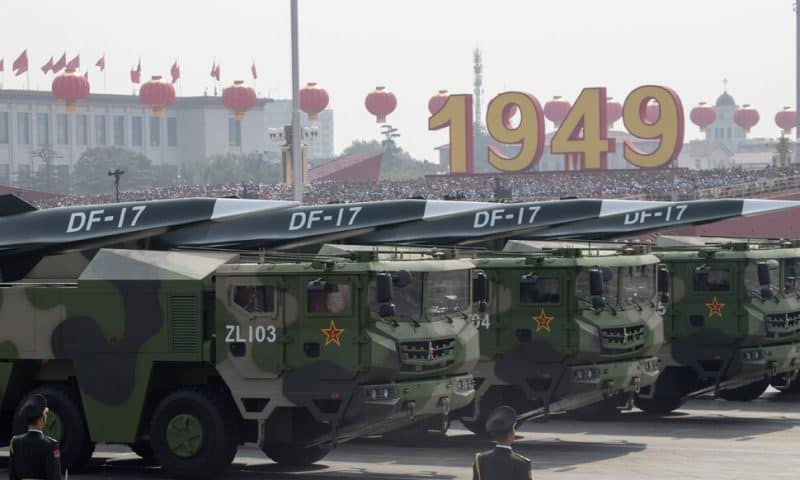The move in response to House Speaker Nancy Pelosi’s high-profile visit to the island nation shows Beijing’s burgeoning standoff with the U.S. is only now beginning.
China signaled on Wednesday it plans to dramatically escalate military provocations aimed at Taiwan to include flying missiles over it for the first time, a clear sign that House Speaker Nancy Pelosi’s departure from visiting the island nation marks not the end of a burgeoning standoff with the U.S. but rather the beginning of one.
The English-language Global Times news outlet, which is aligned with the Chinese Communist Party, included in a post early Wednesday “that conventional missiles are expected to fly over the island of Taiwan for the first time” in response to the California Democrat’s daylong stopover to meet with local officials, which Beijing considers a clear break from standing policy governing the island over which it claims dominion.
Other posts have indicated China’s military operations serve as a rehearsal for the forced reunification of the mainland and Taiwan, which Beijing considers nothing more than a renegade province.
“It is both unprecedented and highly provocative,” Taylor Fravel, an expert on Chinese military decision-making and a professor at MIT, says of the proposed missile launches. He adds it is “clearly designed to intimidate the people of Taiwan and underscore the threat of Chinese missiles to the island.”
While the Global Times is not a direct mouthpiece for the Chinese government, current and former U.S. officials and analysts believe the content the outlet produces aligns with the party’s intentions and that it frequently publishes what party officials choose not to say publicly themselves.
Analysts consider the latest moves a marked escalation over the kind of military exercises that usually accompany a perceived slight against Beijing. Its Eastern Theatre Command has indicated it plans the closure of an area east of Taiwan to be used for conventional firepower missile tests, which could mean the use of ballistic missiles. Depending on the location of the launches, the missiles could overfly Taiwan.
White House officials have indicated in recent days that the response to Pelosi’s visit – both in advance of her arrival and after she touched down aboard a U.S. military aircraft on Tuesday – had at that time aligned with normal escalations. National Security Council spokesman John Kirby told reporters moments after Pelosi’s arrival that “what we’ve seen thus far … is consistent with the playbook that we expected them [China] to run. And we’ll just keep watching it.”
And officials in Beijing have stated clearly they will continue to respond forcefully to Pelosi’s visit. Its military announced earlier this week that it will begin maritime drills on Thursday in zones encircling Taiwan that come far closer to the island’s shores than prior displays. Some of the zones in which it says it will operate come within 10 nautical miles of the Taiwanese mainland.
Taiwan’s Ministry of National Defense also announced early Wednesday an incursion by three Chinese military aircraft in the Taiwan Strait across the median line – a division bifurcating the waterway also known as the Davis Line that Chinese aircraft have crossed with increasing regularity in the last two decades. Other Chinese officials have since said the median line “ceases to exist.”
Taiwan has asked its port authority to tell ships to avoid its waterways in the coming days in anticipation of China’s announced military activity.
“The coming period may be bumpy,” the Brookings Institution’s Ryan Hass wrote on Twitter. “It will be important for officials to remain in direct contact, for each side to exercise discipline, and focus on preserving peace and stability in [the] Taiwan Strait. Smarts, not flexes of strength, will be needed to navigate this period.”
David Sacks of the Council on Foreign Relations predicted that China would escalate beyond its prior military responses given its recent behavior and the gravity of the current circumstances.
“To send a message, China will now have to do something that rises significantly above that kind of baiting, which means its options are increasingly escalatory,” Sacks wrote in Foreign Affairs.
China has previously escalated its military activity on a level similar to the current standoff, analysts say, including in the 1995-1996 Taiwan Strait Crisis, when it launched a series of missiles to challenge Taiwan’s president at the time and undermine its presidential elections.

